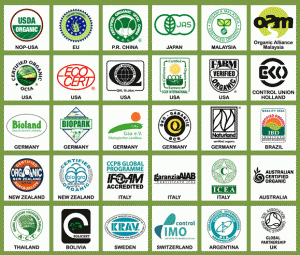 Information about what organic certification implies is important to consumers, and there is evidence of some confusion on this point. From the Danish literature, there are examples of confusion about imported organic foods correctly equipped with the Danish â€Ã˜â€-label. Such foods are wrongly believed to be of Danish origin. The various exemptions from the organic certification rules – for example, regarding use of some types of pesticide, or of a small percentage of fertilizer from non-organic sources – are examples of other issues, which evidently come as a surprise to many consumers, if indeed they become aware of them.
Information about what organic certification implies is important to consumers, and there is evidence of some confusion on this point. From the Danish literature, there are examples of confusion about imported organic foods correctly equipped with the Danish â€Ã˜â€-label. Such foods are wrongly believed to be of Danish origin. The various exemptions from the organic certification rules – for example, regarding use of some types of pesticide, or of a small percentage of fertilizer from non-organic sources – are examples of other issues, which evidently come as a surprise to many consumers, if indeed they become aware of them.
Organic Certification and Genetic Modification
Concern about genetic modification is often related to a preference for organic certification of food, and buying organic is reported to be a strategy for avoiding GMOs. Even if this is a fully valid precautionary strategy, as the use of GMOs is forbidden within organic certification, lack of reliable methods for analyzing whether GMOs are used or not represents insecurity about actual practice. These kinds of challenges relating to risk assessment are naturally not confined to the evaluation of organic certification of food, but the organic food chain is not spared of it either.
It is, therefore, important that the rules and regulations should be made available to consumers. But it is also important that consumers have the opportunity to relate “bits of information†from regulations and codes of practice to a broader understanding of the contexts they relate to. Thus the issue of availability of information must be seen in connection with broader food system knowledge among consumers.
Organic Certification: Food system knowledge
There is evidence that many consumers feel they do not have as much knowledge about food and food system issues as they would like (for example, in literature from the UK), and that better availability of such information would be welcomed. But how is availability to be improved? As mentioned in the discussion about labels, it can look somewhat paradoxical that consumers want both more knowledge, and more complex information, yet also more simple labeling. One might argue that organic food – certified and labeled – already in itself provides more food system information to the consumers than is normally the case with conventional food.
But the organic food system is generally subject to stricter regulation than the conventional food market (Morgan and Murdoch 2000), and buying organic food might in this respect be seen as a complexity-reducing strategy (Luhmann 1999). Nevertheless the issue of information within organic food systems needs to be further addressed. The exploration of an “organic HACCP†approach is desirable in this context.
One answer could be simple labels with clear and explicit references to the certification rules and to more detailed information about the background, enforcement etc. Buying organic food may be a simple way to deal with challenges and uncertainties associated with the contemporary food supply. At the same time, those choosing this as an alternative to conventional foods, include many critical, knowledgeable consumers whose information demands may be particularly high.